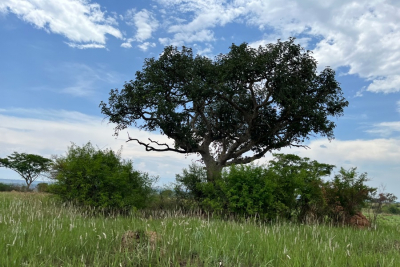Plants cooperate to coexist

An international scientific study led by the Doñana Biological Station and the Universidad Rey Juan Carlos reveals that cooperation can systematically increase diversity when it occurs reciprocally between interacting species in a plant community.
These results have been published in the prestigious journal Nature Ecology & Evolution, challenging the theory of competition between species. For decades, ecology has assumed that the most competitive species outcompete the others. However, in the article "Indirect reciprocal facilitation promotes species coexistence in plant communities worldwide"A scientific team has demonstrated that recruitment facilitation interactions—where adult individuals modify their environment and create favorable conditions for other species to germinate and establish themselves under their canopy—are not only frequent, but, in most cases, involve reciprocity. "Species that benefit others also receive benefits in return, often through indirect interactions involving other intermediary species, following the idea that a friend of my friend is my friend," the researchers note.
This finding offers a novel perspective on the mechanisms that sustain biodiversity, highlighting the key role of cooperative relationships in nature. Reciprocal facilitation—whether direct or indirect—emerges as a fundamental mechanism in the structure and resilience of plant communities on a global scale, in contrast to the traditional view focused on competition.
The work was led by Joaquín Calatayud, a researcher at the Global Change Research Institute of the Rey Juan Carlos University (IICG-URJC), and Rafael Molina Venegas, from the Doñana Biological Station (EBD-CSIC). Also participating in this research were Ezequiel Antorán, a member of the IICG-URJC; Miguel Verdú and Alicia Montesinos Navarro, both from the Center for Desertification Research (CIDE, CSIC-UV-GV); Julio M. Alcántara, from the Interuniversity Institute for Earth System Research in Andalusia (IISTA) and the University of Jaén; and José L. Garrido, from the Zaidín Experimental Station (EEZ-CSIC).
The “law of the strongest” versus interspecies collaboration
Researchers have identified different facilitation networks in which benefits are transmitted between several species and eventually returned to the original benefactor. These loop-like structures promote the coexistence of a greater number of species and reinforce community stability. Furthermore, the scientific team has observed that, as facilitation loops lengthen, positive interactions intensify and negative interactions between the species involved decrease, favoring the long-term stability and persistence of these natural communities.
Based on these results, the study invites us to review the classic notion of “survival of the fittest” and to recognize that collaborative interactions between species, in line with the theory of reciprocal altruism proposed by Robert Trivers in the 70s, can play an essential role in the evolution and conservation of biological diversity.
Reference
Rafael Molina-Venegas, Miguel Verdú, Alicia Montesinos-Navarro, Julio M. Alcántara, José L. Garrido, Ezequiel Antorán, Joaquín Calatayud. Indirect reciprocal facilitation promotes species coexistence in plant communities worldwide. Doi: https://doi.org/10.1038/s41559-025-02766-9